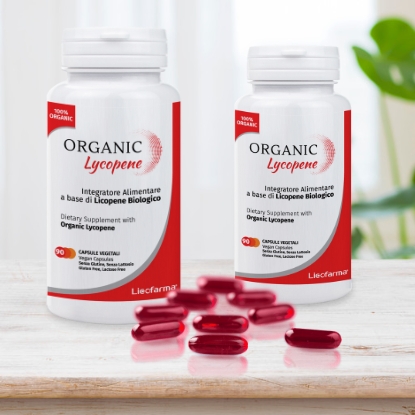How many times have we heard about the importance of consuming antioxidant-rich foods every day? But why are antioxidants so important for our health and, more importantly, what are they and what are the main natural antioxidants? Let's find out in this article.
What are Antioxidants
Let's start, first of all, with the term antioxidant and its meaning. In general, when we talk about antioxidants we refer to anything that is able to slow down or prevent oxidation processes. As far as our body is concerned, antioxidants are the molecules that help our cells defend themselves from the harmful and dangerous action of free radicals.
 They are mainly enzymes, vitamins and minerals that form a sort of defence barrier for our organism. They are found in almost all organs and tissues, particularly in the blood, and can be considered true sentinels that intercept free radicals and neutralize them, oxidizing themselves in place of other noble molecules (proteins, lipids, etc.). We could call them "altruistic molecules", which sacrifice themselves to protect the structures vital for the functioning of our organism.
They are mainly enzymes, vitamins and minerals that form a sort of defence barrier for our organism. They are found in almost all organs and tissues, particularly in the blood, and can be considered true sentinels that intercept free radicals and neutralize them, oxidizing themselves in place of other noble molecules (proteins, lipids, etc.). We could call them "altruistic molecules", which sacrifice themselves to protect the structures vital for the functioning of our organism.
Free radicals and Antioxidants
The metabolism of all living beings, including ours, is based on a series of chemical reactions necessary, for example, to transform nutrients into energy useful for the functioning of cells and tissues. Most of these reactions, however, are oxidative, that is, they release waste substances potentially harmful to our health when they are not disposed of by the body.
These waste substances are called free radicals, which are highly reactive molecules capable of oxidizing other nearby molecules such as proteins, carbohydrates and even DNA and RNA, causing damage to cells and tissues. The role of antioxidants is precisely to prevent this from happening.
You can learn more by reading our article on what free radicals are and why they are bad for your health.
What Substances Form the Body's Antioxidant Defense
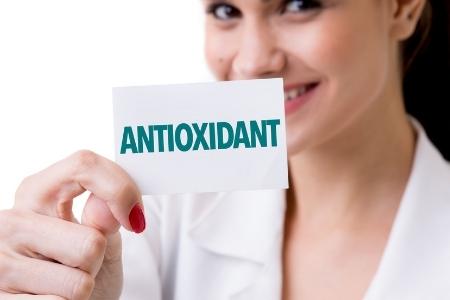 The substances that form the antioxidant defense of our body are divided into endogenous and exogenous.
The substances that form the antioxidant defense of our body are divided into endogenous and exogenous.
- Endogenous antioxidants are those naturally produced by our body. These include Glutathione, considered the most powerful antioxidant known, Coenzyme Q10, Alpha Lipoic Acid, Superoxide Dismutase, Bilirubin and Melatonin.
- Exogenous antioxidants, instead, are those that are not directly produced by our body but are assimilated through diet. Among these, the most important are Carotenoids, Polyphenols and some Minerals and Vitamins, all substances contained mainly in fruits and vegetables, which are by far the foods richest in antioxidants.
What Antioxidants Are Good For: Benefits and Properties
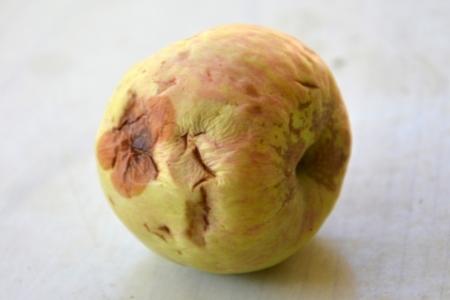 Antioxidants are important for our health because, by oxidizing in place of other cellular structures, they protect the body from damage related to oxidative stress. Antioxidants, in particular, protect cells and tissues from premature aging by contributing to:
Antioxidants are important for our health because, by oxidizing in place of other cellular structures, they protect the body from damage related to oxidative stress. Antioxidants, in particular, protect cells and tissues from premature aging by contributing to:
- prevent the onset of cardiovascular disease;
- prevent neurodegenerative and metabolic diseases such as Alzheimer's and diabetes;
- protect the health of your eyesight;
- slow down skin aging and protect the skin from photodamage;
- Mitigate the negative effects of certain natural defense phenomena of the body such as inflammation;
- protect against damage caused by exposure to pollutants, allergens and the side effects of certain medications;
- reduce stress and fatigue following strenuous physical activity.
Read our article on what oxidative stress is and the damage to our health.
What Are Antioxidant Foods
As we have already seen, most antioxidants are assimilated by our bodies through what we eat. So let's take a look at the relationship between antioxidants and foods.
Considering the importance of these substances for the health of our body, it is essential to know which are the antioxidant foods that should never be missing on our tables.
Antioxidant Vitamins
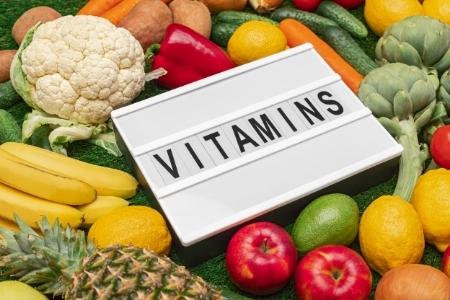 The main vitamins with antioxidant action are:
The main vitamins with antioxidant action are:
- Vitamin C, contained in fruits and vegetables, citrus fruits are very rich in it but we also find it in currants, kiwi, peppers, tomatoes, spinach, cabbage and asparagus.
- Vitamin A, found mainly in cheese, eggs, oily fish, milk, yogurt and liver.
- Vitamin E, which is stored by the liver and released when needed. The foods richest in Vitamin E are oils, especially extra virgin olive oil, wheat germ oil and sunflower oil, dried fruits such as almonds and hazelnuts, cereals, especially wheat, oats, barley and corn.
Antioxidant Minerals
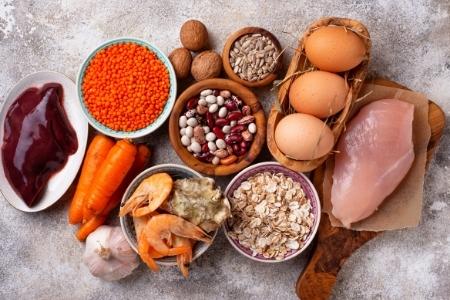 The most important minerals that have valuable antioxidant activity for our body are:
The most important minerals that have valuable antioxidant activity for our body are:
- Selenium, found in fish, chicken, turkey, brown rice, walnuts, cashews, milk, eggs, beans, lentils and spinach.
- Manganese, found in many plants and herbs including basil, bay leaves, parsley, thyme and mint, in spices such as ginger, cinnamon, pepper and cloves and also in whole grains and green leafy vegetables such as chard, cabbage, broccoli and lettuce.
- Copper, which is rich in foods such as liver, shellfish, molluscs, nuts and peanuts in particular, cereals such as wheat and rye, as well as beans, lentils and cocoa.
- Zinc, which is found in seafood, mushrooms, legumes such as beans, lentils and chickpeas, nuts especially pistachios, almonds, walnuts and peanuts, cereals such as quinoa and millet, oilseeds such as sunflower seeds and sesame seeds and even eggs, chicken meat, liver and beef.
Antioxidant Foods Rich in Carotenoids
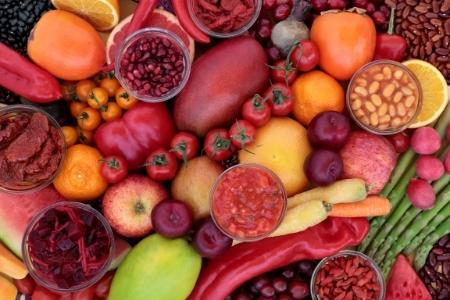 Carotenoids are natural pigments typical of yellow, orange and red fruits and vegetables. They are very important substances as they have a high antioxidant power. Let's see what are the main carotenoids and in which foods we find them.
Carotenoids are natural pigments typical of yellow, orange and red fruits and vegetables. They are very important substances as they have a high antioxidant power. Let's see what are the main carotenoids and in which foods we find them.
- Beta-carotene, contained mainly in carrots, pumpkin, apricots, oranges, tomatoes, peppers but also in green leafy vegetables and cereals. In addition to having a powerful antioxidant action is important as a precursor of Vitamin A.
- Lycopene, the red dye in tomatoes, is considered one of the most powerful scavenger antioxidants. In addition to tomatoes and its derivatives such as sauces, gravies and concentrates, lycopene is also found in fruits such as watermelon, papaya, apricots and mango. Learn more about Lycopene and its valuable antioxidant properties.
- Lutein and Zeaxanthin, very important antioxidants for healthy eyesight. Inside the body, in fact, are concentrated mainly in the central part of the retina, helping to protect it from damage by ultraviolet radiation. Foods rich in Lutein are egg yolk, kiwi, mango, beans, spinach, broccoli, carrots and papaya. Zeaxanthin, on the other hand, is found mainly in peaches, apricots, oranges, melon, papaya, plums.
Antioxidant Foods Rich in Polyphenols
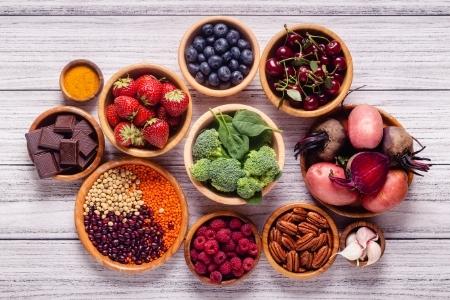 Polyphenols are very powerful antioxidants that can never be lacking in our diet. They are the largest group of antioxidants and are contained in a wide variety of plants. They are divided into:
Polyphenols are very powerful antioxidants that can never be lacking in our diet. They are the largest group of antioxidants and are contained in a wide variety of plants. They are divided into:
- Flavonoids, which represent the largest family of polyphenols. They include, among others, the isoflavones contained in soybeans and legumes. The catechins in which green tea is rich and that we can also find in cocoa and its derivatives such as dark chocolate, and to a lesser extent in fruits such as blueberries and red grapes, apples, peaches, plums. The anthocyanins in which all red fruits are rich.
- Phenols or phenolic acids, contained mainly in cabbage, onions (rich in quercetin), broccoli and black radish.
- Lignans, in which whole grains, flaxseeds and sesame seeds are rich.
- Stilbenes, the most important being resveratrol found mainly in grapes and their derivatives, especially red wine as well as peanuts and red fruits.
Antioxidant supplements: when to take them
There is no doubt that following a rich and varied antioxidant diet is always the preferred choice, also considering the fact that there are many foods from which we can choose.
There are, however, periods or particular conditions during which it may be useful to strengthen the antioxidant defenses using supplements. Some of these conditions could be, for example, periods of excessive psychophysical stress, special diets, prolonged intake of certain drugs, periods of intense physical activity especially when it is carried out at a competitive level.
In any case it should be borne in mind that supplements should be chosen carefully, always preferring those based on active plant ingredients. In addition, they should never be taken for very long periods of time and it is always important to follow the advice of your doctor or nutritionist. Even an excess of antioxidants, in fact, could be a problem for our body.
Organic Lycopene the 100% organic Lycopene supplement. Discover our most powerful antioxidant supplement.
Disclaimer:
The information on this site is for informational purposes only and is not intended in any way to replace the advice of your doctor or specialist. With reference to the products recommended on the site, it is recommended to always seek the advice of your doctor or specialist before use. In no event shall the owner of the site be liable for any damages resulting from the misuse by the user of the content and information published on the site.





